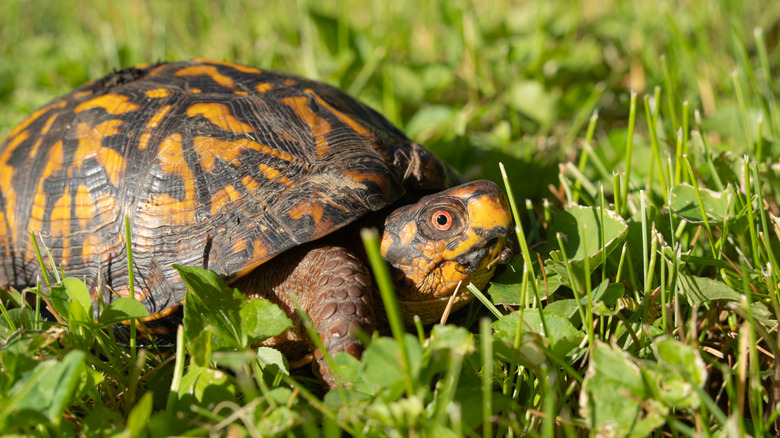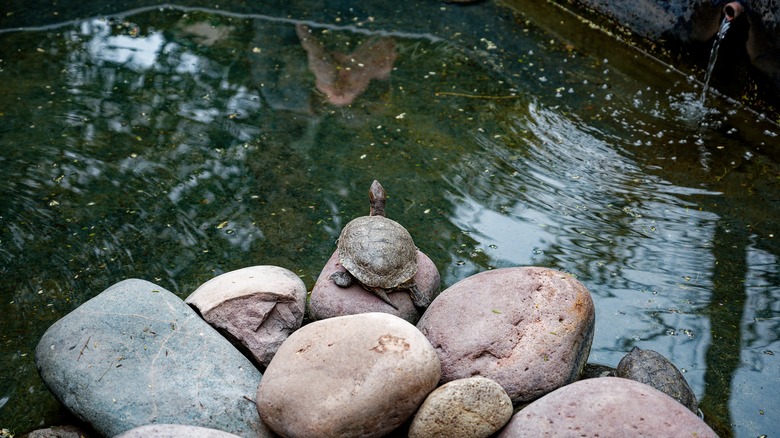Why Spotting Turtles In Your Yard Can Be Great For Homeowners (And Bad For Pests)
Got bugs in your yard? Seriously, who doesn't? If it isn't mosquitoes, it's flies or all sorts of pests making outdoor plans practically hellish. But guess what? There's an unusual and fascinating way to help repel bugs naturally: turtles. Yes, you read that right. Turtles.
The concept of using turtles for pest control is backed by science. Researchers have conducted various studies to understand how effective turtles are at reducing pest populations. A 2007 study in the Journal of the American Mosquito Control Association showed that juvenile red-eared slider turtles in mosquito-infested ditches ate the insect larvae in large quantities. Over time, researchers observed a staggering 99% reduction in mosquito larvae.
Several species of freshwater turtles could potentially find their way to your yard. Red-eared sliders are among the most common and are known for their distinct red markings on the sides of their heads. Other species you might encounter include painted turtles, known for their vibrant and colorful patterns, and snapping turtles, which have a more rugged appearance. Each species has its unique characteristics and behaviors, so you'll want to do your research ahead of time to see which live in your area and which might be enticed into your yard.
How can you attract turtles to your yard?
If you're interested in using turtles for pest control, you might be wondering how to attract these shelled creatures to your yard. Creating a turtle-friendly lawn and environment is easier than you think. Start by making sure you have a water source like a small pond or water garden, as turtles need access to water for hydration and feeding. You will also want to provide plenty of hiding spots and basking areas. Rocks, logs, and plants can create a safe and inviting habitat for turtles. Remember to keep the area free from pesticides and chemicals that could harm these beneficial reptiles.
Now, while turtles are excellent pest controllers, their presence offers additional benefits. For one, they contribute to the overall health of your yard's ecosystem. By controlling pests, turtles help maintain a balanced food web, ensuring no single species becomes too dominant. Also, traditional pest control methods (unlike some kitchen ingredients you can use for DIY pest control) often involve chemicals and pesticides that can harm the environment and non-target species. Turtles offer a natural and eco-friendly alternative. Unlike chemical treatments, turtles specifically target pests without disrupting the broader ecosystem. It's a win-win for you and your yard.
Are turtles safe to have in your backyard?
While turtles can be beneficial, it's essential to remember that they are wild animals. It's crucial to respect their space and not handle them unless necessary. Wild turtles can carry germs like Salmonella, and handling them without proper knowledge can be harmful to both you and the turtle. If you see a turtle in your yard, enjoy observing it from a distance. If you need to move it for any reason, use gloves or a towel to gently lift and relocate it to a safe area. In some cases, you might come across an injured turtle or one that poses a danger to other animals or people, such as a snapping turtle. Snapping turtles can be particularly defensive and have a powerful bite. If you encounter a snapping turtle or any turtle that seems injured, it's best to call a qualified animal rehabilitator. These professionals have the expertise to handle and care for turtles properly, ensuring their safety and yours.
Another important point is to avoid feeding turtles. While it might be tempting to offer them a snack, feeding wild turtles can disrupt their natural foraging behavior and lead to dependency on human-provided food. This can ultimately harm their health and survival. Turtles are well-equipped to find their own food, such as the pests you want them to help you control, so it's best to leave them to do what they do best.


